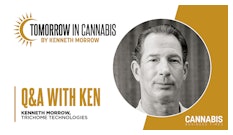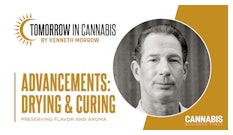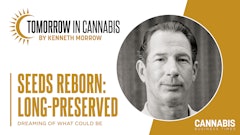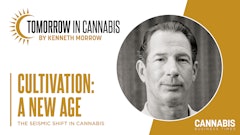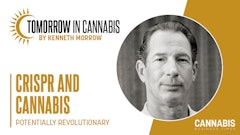
Even though Sept. 25, 1993, was 30 years ago, I remember every detail of that day vividly, as it was on that day I was arrested for commercial cannabis cultivation and possession for sale. I had just returned from an out-of-town trip, which I could do, as my aeroponic garden in my basement was fully automated. As I started to approach my house, my neighbor called me over and said that half a dozen “officers dressed in black like the Gestapo have been at your front door,” apparently kicking on my door and announcing themselves loudly. My neighbor then pointed to a car parked in an alley behind my house and said one of the officers was in that car. I thanked my neighbor and told the friend I was with to ask my family to contact my attorney.
My friend left, and I approached the undercover officer in her car. I asked whether there was a problem because she was surveilling my property. It seemed as if the officer was nervous because she immediately radioed for backup. When more officers arrived, they asked if I knew why they were there. I replied that I did not. They explained that they had information to suggest that I was cultivating cannabis in my house—I believe they had an informant—then asked for permission to search my home. I said that they could search only after they obtained a warrant. The sergeant in charge asked if I was really going to make him get a warrant and that they just wanted to look around real quick and if there was no problem, they would simply be on their way. I stood my ground, and told them they could only search after they obtained a warrant, and I was detained.
After sitting handcuffed in the back of a police car for four hours, they returned with a warrant signed by a judge. They asked for my keys, otherwise, they would have to force their way in. The officers were polite and professional and explained this calmly. I conceded the keys and waited in the car. They first entered the living room, then proceeded to the basement of the house, which is all on a video they recorded. After looking around for a bit, they came back out and asked me how to get through the false wall I had built—which was simply a particle board wall with shelves and tools—in the basement. I replied I wanted to exercise my right to remain silent respectively.
Next to arrive was the fire department, which seemed odd at the moment. Then I was told the fire department was called so that they could saw through the walls until they found what they were there for. But the problem with this plan was that there was a risk of fire personnel getting electrocuted. I explained, without making admission of guilt, that out of safety concerns for fire personnel, I would open the door. As I started to open the door, the officers began to record again, whereupon I stopped and requested to go back to the police car. So, they stopped videotaping me, I opened the door and was escorted to the car. Eventually, they discovered my grow, which included 300 cultivated plants and 200 cuttings.
Soon after, the police drove me to the Vallejo, Calif., station, and I did not realize how much more fun the adventure was about to get. After six hours in a freezing cell, the door opened and one of the officers who was searching my home stated that although I made them work hard, they seized my grow equipment, as well as cultivation books, pipes and other personal items. I lost an amazing genetics collection that included early-era Northern California genetics, including cultivars known then as Salmon Ridge and Hobbit. Forfeiture seizure law at the time allowed them to take anything they wanted and claim it was purchased with drug proceeds, and the burden of proof was on me to prove where it came from and how it was legitimately paid for. That meant they also seized my Yamaha TZ250 motorcycle that I rode in Formula Two races. From the local jail, I went to the Solano county jail to await arraignment. My bail was set at $50,000, which I did not have, nor was I going to pay 10% to a bondsman. When the arraignment happened a couple days later, my lawyer wasn’t present, and a court-appointed defense attorney came to see me.
He looked quizzically at me, in my orange jail attire with shackles on my hands and feet, and said, “Did you actually do all this? If so, you are in a lot of trouble.”

Trial & Serving Time
Fortunately for me, an attorney from a very reputable law firm ultimately represented me. After the arraignment, I spent six weeks in jail until I raised $50,000 for bail. My family had to put up property as collateral, and months later my trial began. The police said that marijuana odor coming from my home prompted their search. But they already said that the initial warrant was initiated because of a statement from a confidential informant. My lawyer hired a local meteorologist to testify that given that my house was situated on a hill, and the proximity of the front door—which was lower than the ventilation from my plants—combined with the hot temperature that day, there was no possible way the officer smelled marijuana. Other expert witnesses were hired to testify to the same, as well as my surrounding neighbors, who testified that they never smelled marijuana. This all meant nothing because the evidence clearly proved that I was cultivating cannabis. We requested a “Franks Hearing,” which is a proceeding where the court decides if the police officers involved lied to obtain a search warrant, and named after the 1978 U.S. Supreme Court Case that set the precedent. This was denied, and any experts called by my attorney who testified were eventually subpoenaed by the deputy district attorney. I had told my attorney that I refused to lie and say I did not cultivate the cannabis, and that I would refuse to apologize for it or say I was wrong for doing so. Faced with the obvious evidence in front of me, it would be hard to say, “That’s not mine.” The only rational option was a plea bargain. Because I had no record, it was hard to throw the book at me, so to speak. I pled guilty to commercial cultivation and possession for sales, and was sentenced to six months in county jail, two years probation and a small fine for court costs.
The day I entered county jail to serve my six-month sentence, I was contacted by the lead sheriff, who it so happened was a friend of a mutual friend of mine who was also a motorcycle enthusiast. He said he would do his best to get me out of there as soon as possible. He gave me the maximum allowed number of days off my sentence for sweeping floors. He came to me one morning and said he was releasing me on something called “sheriffs parole” and asked if I would be OK with being home before 8 p.m. in case they called to make sure I complied. I said, “No problem,” and, after 10 weeks, I came to the end of my incarceration experience.
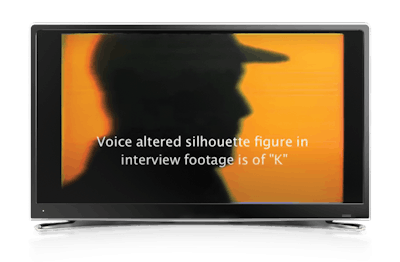
Probation and Rebuilding the Grow
After being released, I reported to the probation department and met a probation officer in charge of my case. The subject quickly turned to motorcycles and motorcycle racing because the seizure of my motorcycle was noted in my file, and we talked about motorcycles for 45 minutes. He then said I must register as a commercial cultivator at my local police station, and any new police station registration, should I move. He told me that I must submit to urinalysis three times a week, and then said that was our last contact and assigned me another probation officer. The next probation officer, after reviewing my clean urinalysis results, assigned me another probation officer, who said to only submit a urinalysis two times a week. But for the hell of it I continued three times a week, figuring it cost them money. Probation officer No. 3, seeing that I was still testing three times a week, said to only test once a week, and assigned me another probation officer. This process continued for months until probation officer No. 6 figured out I was still testing three times a week and ordered me to stop. I was always clean, and they did not know what to do with the marijuana cultivator. After paying the fine, attending required drug classes, and two years of probation, my charges were expunged and my file sealed, as if it never happened.
As all this was happening, I was still fighting to get my belongings back, including my aeroponic grow equipment (my lawyer’s worst nightmare) and my seized motorcycle.
The motorcycle was auctioned off to a police officer “accidentally” for pennies on the dollar, and 70% of the proceeds returned to me.
As for the grow equipment, my lawyer asked the judge if I could donate it, which the judge agreed to. A friend who worked for a California state-funded facility said they would accept the equipment and documented this in a letter, which was submitted to the court. Despite the judge’s approval, the deputy district attorney sent a letter to the state entity to confirm the letter’s authenticity. My friend replied yes, she did in fact provide the letter in question. On the scheduled day of pickup, another friend arrived at the evidence and property storage site, and inside a storage building was my grow equipment and other property. The attendant pointed to the pile and left. My friend immediately noticed there were items not on the return list included, so he rushed to load everything that was mine and left as quickly as possible. I was surprised to see many of my cultivation books, little knickknacks and pipes were returned. And the recovered grow equipment was utilized immediately and is featured on my “60 Minutes” appearance and interview with Morley Safer, where I went only by “K” and my identity was concealed. In fact, I harvested my first post-arrest crop almost a year to the date of my arrest using that previously confiscated grow equipment.
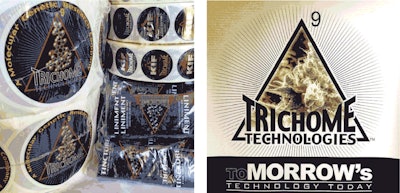
Trichome Technologies Is Born
When Proposition 215 passed in California in 1996, my company, Trichome Technologies, supplied multiple top-tier cannabis dispensaries that existed in the early days. During this period I bent over backwards to comply with the spirit of the Prop 215 rules and guidelines, as it was important for me personally to do my very best to be as legally legitimate as possible. At one time, I and Trichome Technologies were considered a legal officer of the City of Oakland, Calif., which stated that I was “immune from civil and criminal penalty” under the federal Controlled Substances Act, as designated by Jeffrey Jones of the Oakland Cannabis Buyers Cooperative, whom had also been deemed the same. For many years my company provided multiple genetics, such as Purple Kush, also known as Ultra Violet to Northern California dispensaries, as well as a plethora of cultivars of finished products. I was one of the first to brand my company more than 20 years ago. I produced photos and content for many publications on multiple continents. I did my best to educate without ego. I refused to work with or take money from bad actors or people and companies. I did it all for the love of doing it, not financial gain.
I’m pointedly aware many of my friends and associates and millions of others received much harsher treatment and sentences for cannabis charges. I’m only reflecting on my experience 30 years ago. Today my charges would be simple misdemeanors, not felonies as I received. Today, police can’t immediately seize property as they could in 1993. Many aspects of cannabis legalization have evolved in 30 years and the legal awakening that has taken place in Canada, Thailand, Germany, Mexico and many other countries that have legalized cannabis for medical or adult-use. Now adult-use cannabis is legal in half of the states in the U.S. Proposition 64 in California created legal pathways for citizens to produce cannabis legally, both commercially as well as for personal use if one chose to grow, being legally no different than a tomato plant in a backyard, as it should be, and should have been all along. It’s truly shameful the lives that were destroyed or altered by cannabis prohibition and continue to be today in non-legal states and countries. Yet, cannabis is still not federally legal, and there are many banking and tax limitations. It sometimes feels like, as the saying goes, the industry goes “three steps forward, two steps back.”
In Cannabis Business Times’ 2023 “State of the Cultivation Industry Report,” just 39% of participants said they were profitable. A 2023 Whitney Economics report noted that just 25% of the cannabis businesses in the U.S. today are profitable. How would it have been perceived 30 years ago if I told the U.S. government that the best way to destroy the cannabis industry was to legalize it, overtax and overregulate it, and utilize legal freedom as a lure?
When my book “Marijuana Horticulture Fundamentals: A Comprehensive Guide to Cannabis Cultivation and Hashish Production” was published in 2016, I contacted the now retired Deputy District Attorney Linda Wayne, who was on the case in 1993. I called her on the phone and explained who I was. She was taken aback, and by the clicking of the keys, I could tell she was googling me.
I explained that I had written a book and asked permission to send her a signed copy, which I did. I also sent her a year’s worth of Cannabis Business Times magazines, featuring my column. It was still important for me that she knew, while she had won the battle, I, the cannabis industry and consumers are slowly winning the war. When we spoke, I thanked her for prosecuting me, that by doing so it spurred me to disseminate and share as much cultivation information as possible in hopes to overgrow the government, and that by prosecuting me, she allowed me to travel the globe, to meet a million like-minded cannabis enthusiasts worldwide, to share ideas, information and most of all, cannabis.
And maybe I also will send her a copy of this column.














